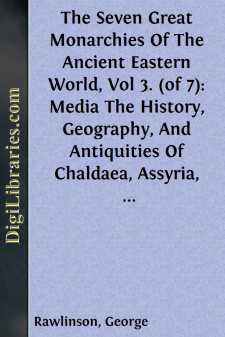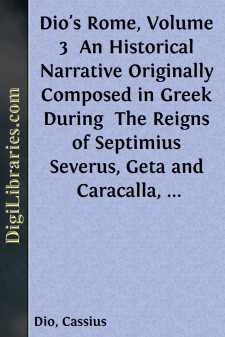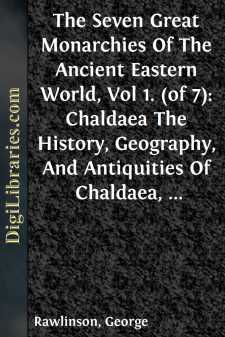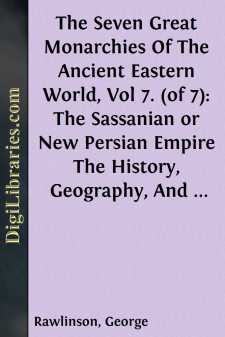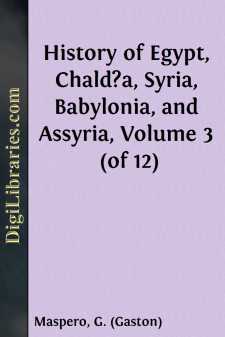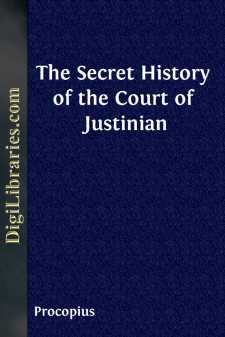History
- Africa 30
- Americas (North Central South West Indies) 50
- Ancient
- Asia 58
- Australia & New Zealand 8
- Canada 41
- Caribbean & West Indies 1
- Civilization 20
- Eastern Europe 12
- Europe 310
- Expeditions & Discoveries 60
- General 77
- Historical Geography 1
- Jewish 9
- Latin America 3
- Medieval 8
- Middle East 13
- Military 248
- Revolutionary 8
- Study & Teaching 5
- United States 353
- Western Europe 56
- World 13
Ancient Books
Sort by:
by:
George Rawlinson
CHAPTER I. DESCRIPTION OF THE COUNTRY. Along the eastern flank of the great Mesopotamian lowland, curving round it on the north, and stretching beyond it to the south and the south-east, lies a vast elevated region, or highland, no portion of which appears to be less than 3000 feet above the sea-level. This region may be divided, broadly, into two tracts, one consisting of lofty mountainous ridges,...
more...
by:
Cassius Dio
BOOK 45, BOSSEVAIN.) [B.C. 44 (a. u.710)] [-1-] This was Antony's course of procedure.вÐâGaius Octavius Copia,вÐâthis was the name of the son of Caesar's niece, Attia,вÐâcame from Velitrae in the Volscian country, and having been left without a protector by the death of his father Octavius he was brought up in the house of his mother and her husband, Lucius...
more...
CHAPTER I—THE CRUSADERS IN EGYPT The Ideal of the Crusader: Saladin's Campaign: Richard I. in Palestine: Siege of Damietta: St. Louis in Egypt: The Mamluks: Beybars' Policy. The traditional history of the Christian Church has generally maintained that the Crusades were due solely to religious influence and sprang from ideal and moral motives: those hundreds of thousands of warriors who went...
more...
by:
Jacob Abbott
Chapter I. A.D. 37Roman country seats.In ancient times, when the city of Rome was at the height of its power and splendor, it was the custom, as it is in fact now with the inhabitants of wealthy capitals, for the principal families to possess, in addition to their city residences, rural villas for summer retreats, which they built in picturesque situations, at a little distance from the city, sometimes...
more...
CHAPTER I. A ROMAN BOY. A Roman father's first duty to his boy, after lifting him up in his arms in token that he was a true son of the house, was to furnish him with a first name out of the scanty list (just seventeen) to which his choice was limited. This naming was done on the eighth day after birth, and was accompanied with some religious ceremonies, and with a feast to which kinsfolk were...
more...
by:
George Rawlinson
CHAPTER I. GENERAL VIEW OF THE COUNTRY. "Behold the land of the Chaldaeans."—ISAIAH xxiii. 13. The broad belt of desert which traverses the eastern hemisphere, in a general direction from west to east (or, speaking more exactly, of W. S. W. to N. E. E.), reaching from the Atlantic on the one hand nearly to the Yellow Sea on the other, is interrupted about its centre by a strip of rich...
more...
by:
George Rawlinson
CHAPTER I. Condition of the Persians under the Successors of Alexander—under the Arsacidce. Favor shown them by the latter—allowed to have Kings of their own. Their Religion at first held in honor. Power of their Priests. Gradual Change of Policy on the part of the Parthian Monarchs, and final Oppression of the Magi. Causes which produced the Insurrection of Artaxerxes. "The Parthians had been...
more...
"Corruption" in Ancient Rome And Its Counterpart in Modern History Two years ago in Paris, while giving a course of lectures on Augustus at the Collège de France, I happened to say to an illustrious historian, a member of the French Academy, who was complimenting me: "But I have not remade Roman history, as many admirers think. On the contrary, it might be said, in a certain sense, that I...
more...
CHAPTER I—ANCIENT CHALDÆA The Creation, the Deluge, the history of the gods—The country, its cities its inhabitants, its early dynasties. "In the time when nothing which was called heaven existed above, and when nothing below had as yet received the name of earth,* Apsu, the Ocean, who first was their father, and Chaos-Tiâmat, who gave birth to them all, mingled their waters in one, reeds...
more...
by:
Procopius
CHAPTER I The wife of Belisarius, whom I have spoken of in my previous writings, was the daughter and grand-daughter of chariot-drivers, men who had practised their art in the circus at Byzantium and at Thessalonica. Her mother was one of the prostitutes of the theatre. She herself at first lived a lewd life, giving herself up to unbridled debauchery; besides this, she devoted herself to the study of...
more...


